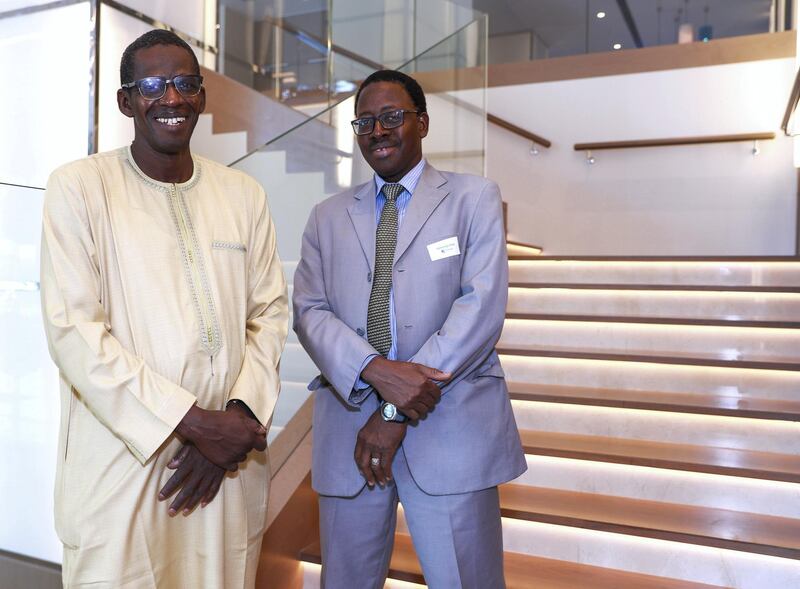Wetlands must be protected to prevent and resolve war, a conference in Dubai heard on Wednesday.
Delegates from Senegal and the Central African Republic have proposed a resolution recognising the critical role of the areas at the 13th Ramsar Wetlands Conference in Dubai.
The resolution is one of the most political at the conference, which is held every three years and attended by delegations from 170 signatory states.
It recognises wetlands such as mangroves, floodplains and marshes are critical areas that maintain peaceful and inclusive societies. Water scarcitycan trigger conflict and lead to mass migration.
Wetlands prevent drought and flooding, and must take priority in conservation, said Jane Madgwick, chief executive of Wetlands International.
“If we talk about water, we need to talk about wetlands because wetlands are where water is stored and where water is regulated,” Ms Madgwick said. “Wetlands are the source for water and the sink for water. The source of the water needs to be part of the equation and it just isn’t.”
The resolution could have implications for long-term water security in the Middle East. Just this week, Israel’s Agriculture Minister threatened to cut water to Jordan in response to that country’s ruler, King Abdullah, cancelling a land-annexing article in its 1994 peace deal with Israel.
“We know that in Iraq, limited water resources is still an issue causing tension and we know that it was a factor in Syria,” Ms Madgwick said.
Dr Karounga Keita, the director of the Sub-Saharan region for Wetlands International, travelled from Mali to explain the situation in the Niger River Delta.
“Fifty years ago the Niger Delta seemed to be a sea,” Dr Keita said. “But the flooding is progressively decreasing, partly due to climate change and largely due to infrastructure. Life in the Niger Delta depends on the pulse of the flood.”
The conflict in Mali, which began in 2012, heightened tensions between communities such as herders, farmers and fishermen who previously managed land with traditional councils.
_______________
Read more:
A fifth of Abu Dhabi's mangroves in moderate or poor health, study shows
'Wetlands are the kidneys of the earth': Ramsar conference begins in Dubai
Scientists gather in Dubai to save world's crucial wetlands
_______________
Foreign Islamist groups introduced new land management practices that have depleted resources.
“They don’t know how to conserve natural resources,” Dr Keita said. “They are new actors coming from outside the Delta and imposing a new sort of governance just to impose taxes.
“After the crisis there was a rise in intolerance between communities, between [militant] groups and local people. The situation became very violent.”
When the economic security offered by wetlands disappears, it leaves people at risk of recruitment to militia. ISIS in West Africa has bribed locals for support in the depleted wetlands of Lake Chad by digging wells and giving out fertiliser and seeds.
"We know that water is important and plays a special role in countries that suffer from conflict," said Martha Urrego, the secretary general of the Ramsar Convention on Wetlands. "We have seen that water scarcity, which many times results from poor management of wetlands, has larger impacts in countries that suffer from drought and more so when populations are vulnerable or suffering from conflict."
Papa Mawade Wade, a programme manager at Wetlands International in Senegal, told how wetland destruction in his country has caused mass migration to Europe.
Rice farming and large infrastructure projects have diverted water from wetlands that are fish nurseries and grow burgu – a tall watergrass used as livestock feed.
“Due to degradation, fishermen have to go further in the sea to fish and due to the lack of fish, some of them change jobs or use fishing boats to go to Europe,” Mr Wade said.
“If we conserve the wetlands, we conserve the area of living for these people so they can get what they had before, like fish and timber, and they don’t need to take the risk of dying at sea. It is a migration issue.”
As climate change has caused the shoreline to rise in Senegal, salinity has increased in the mangroves. Mullet, sardines and tilapia have disappeared and fishing villages that are hundreds of years old have been abandoned.
The resolution recommends that wetland security hot spots be mapped and that areas in relatively good condition, such as the Sudd in South Sudan, be protected to maintain help keep the peace.
Conservation programmes with local communities have proven successful at offering economic support to women and young people.
“A small action has a very large effect because it can support young people in villages so they are not motivated to join armed groups,” Dr Keita said.






